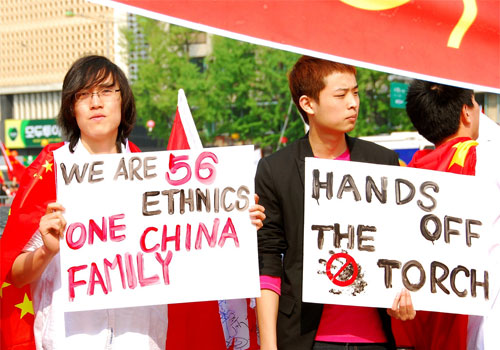
China's Impossible Assimilation Policy Towards Tibet
China, which is denouncing the interference of the global community regarding the Tibet issue, deems the said issue the starting point of a national break up of China. As it is well known, China is a nation with an overwhelming majority of the Han race and 55 other ethnic minorities. This multi-national and multi-cultural characteristic of China forced the country to think about what kind of nationalism it was to develop in order for national unity and development regarding ethnic minorities. In other words, China had been enforcing a two-track policy that at the same time would guarantee ethnic self-government and culture and close all movements for independence.
In light of this, you can say that the Tibet incident was affected by the strong assimilation policy directed by China for the last ten years. After conquering Tibet with military force in 1950 and destroying the independence movement of 1959, the Chinese Government has been undermining Tibet's identity and has tried numerous methods to assimilate Tibet into China. A good example would be the attempts to estrange the Dalai Lama, Tibet's spiritual leader, and the monks who are its social leaders. For the last ten years, the Chinese government has tried to force the monks to deny the Dalai Lama and prohibited believers to pray for the Dalai Lama. However, in light of the fact that Buddhism holds an undisputed position in Tibet's life and culture, the failure of these policies were already foreshadowed. Tibet's society, including politics, economics, history, and even culture, are sustained by the religion's power and authority. It would not be far-fetched to say that the reason Tibetans stayed together to the very end even when China attacked and took away their independence was because of their religious faith. The impossible migration forced by the Hans on the Tibetans caused national conflict in Tibet? society. In effect, China? polices towards Tibet could be the reason for the Tibet incident.

Using the Beijing Olympics to Internationalize the Tibet Problem
On the other hand, Tibet's active efforts towards the international community could be another perspective on this issue. The Tibet problem first became an active cause in the international community when President Clinton visited China for nine days in 1998. That was the first time the Tibet issue was openly discussed between the US and China. Although the discussions by the heads of state were terminated before the point where the relationship between the two countries would have been damaged, it was an important point for the Tibet issue to become sensitive for the international community. It was not that the Tibet issue did not attract attention from the international community before, but the rapid growth of China prevented Western nations from interfering and it was difficult to foresee the Tibet issue becoming internationally acknowledged.
Another reason why the Tibet issue became an international problem is due to the international efforts of the Dalai Lama exiled government. The Dalai Lama, along with internationalizing Tibet's national independence, has actively participated in efforts for human rights, anti-nuclear, environmental security, and other international issues, hence promoting his international standing. These efforts by the Dalai Lama enabled Western society to justify their interference in the Tibet issue. It is easy to read the Dalai Lama? exiled government? purposes regarding their use of the Beijing Olympics as an opportunity to break out. If Tibet's exiled government's best choice, pitted against China's strategy of denying the Dalai Lama and, by doing so, destroying the centripetal force of the independence movement, is to internationalize the Tibet problem, the Beijing Olympics where the whole world would get together, would be a marvelous stage to do it.
It is anybody's guess as to how the Tibetan's rage, built up over decades of oppression, will develop. As Tibetans from all over the world participated in this rally, it is as yet uncertain how this incident will progress as China is still showing signs of aggressive repression. If China regards the Tibet issue as an ethnic conflict with the possibility of a national split, hence non-negotiable, and the Tibetan exiled government refuses to give up their efforts for independence, it is always possible for another physical and bloody incident.
Translated by Lee Shin-young
This contribution may have a different standpoint from the Hanyang Journal's.

